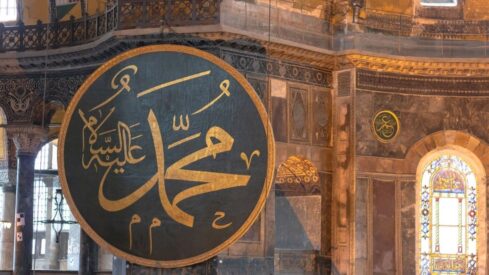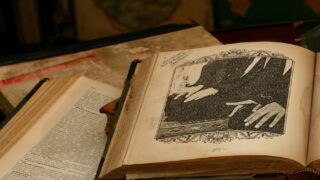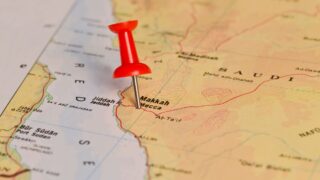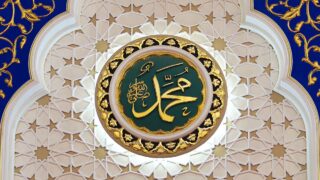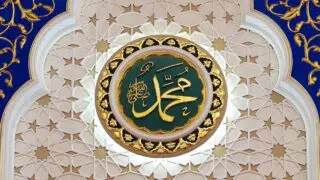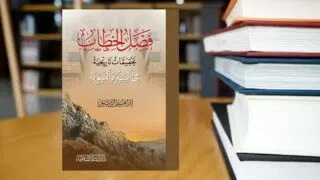It was the custom of the Arabs living in towns to send their children away to bedouin wet nurses so that they might grow up in the free and healthy surroundings of the desert. In this way, they would develop a robust frame and acquire the pure speech and manners of the bedouins, who were noted for the purity of their language and for being free from the vice that usually develops in sedentary societies.
At a young age, the Prophet (peace and blessings be upon him) was later entrusted to Halimah from Bani Sa`d ibn Bakr.
Prophet Muhammad (peace and blessings be upon him) had several foster brothers and sisters; `Abdullah ibn Al-Harith, Anisah bint Al-Harith, Hudhafah or Judhamah bint Al-Harith (known as Ash-Shayma’), and she also used to nurse the Prophet and Abu Sufyan ibn Al-Harith ibn `Abdul-Muttalib, the Prophet’s cousin.
Traditions delightfully relate how Halimah and her entire household were favored by successive strokes of good fortune while the baby Muhammad lived under her care. Ibn Is-haq stated that Halimah narrated that she along with her husband and a suckling babe, had set out from her village in the company of some of the women of her clan in quest of children to suckle. She said:
It was a year of drought and famine and we had nothing to eat. I rode on a brown she-ass. We also had with us an old she-camel. By Allah, we could not get even a drop of milk from this camel. We could not have a wink of sleep during the night for the child was continually crying on account of hunger. There was not enough milk in my breasts and even the she-camel had nothing to feed him. We used to constantly pray for rain and immediate relief. At length we reached Makkah looking for children to suckle. Not one single woman amongst us accepted the Messenger of Allah (peace and blessings be upon him) when he was offered. As soon as they were told that he was an orphan, they refused him. We had fixed our eyes on the reward that we would obtain from the child’s father. An orphan! What are his grandfather and mother likely to do? So we spurned him because of that.
Every woman who came with me got a baby to suckle and when we were about to depart, I said to my husband: “By Allah, I do not like to return along with the other women without a baby. I shall go to that orphan and I must take him.” He said, “There is no harm in doing so and perhaps Allah might bless us through him.” So I went and took him because there was simply no other alternative left for me but to take him. When I lifted him in my arms and returned to my place I put him on my breast and to my great surprise, I found enough milk. He drank to his heart’s content, and so did his foster brother and both of them slept, even though my baby had not been able to sleep the previous night. My husband then went to the she-camel to milk it and, to his astonishment; he found it had plenty of milk. He milked it and we drank our fill, and enjoyed a sound sleep during the night. The next morning, my husband said: “By Allah, Halimah, you must understand that you have a blessed child.” And I replied: “By the grace of Allah, I hope so.”
The tradition is explicit on the point that Halimah’s return journey and her subsequent life, as long as the Prophet (peace and blessings be upon him) stayed with her, was surrounded by a halo of good fortune. The donkey that she rode when she was traveling to Makkah was lean and almost foundered; however, on the return journey it recovered speed much to the amazement of Halimah’s fellow travelers. By the time they reached the encampments in the country of the clan of Sa`d, they found the scales of fortune had turned in their favor. The barren land sprouted forth luxuriant grass and beasts came back to them satisfied and full of milk. Muhammad (peace and blessings be upon him) stayed with Halimah for two years until he was weaned. In this context, Halimah said:
We then returned him to his mother requesting her earnestly to let him stay with us and benefit from the good fortune and blessings he had brought us. We persisted in our request which we substantiated by our anxiety that the child might catch a certain infection that was peculiar to Makkah. Finally, we were granted our wish and the Prophet (peace and blessings be upon him) stayed with us until he was four or five years of age.(Ibn Hisham)
It was reported that Jibril (Gabriel) came down and ripped open the chest of the Prophet (peace and blessings be upon him) and took out his heart. He then extracted a blood-clot from it, and said: “That was the part of Satan in you.” Then he washed it with the water of Zamzam in a gold basin. After that the heart of the Prophet (peace and blessings be upon him) was joined together and restored to its place. The boys he had been with along with his playmates came running to his mother, meaning his nurse, and said: “Verily, Muhammad (peace and blessings be upon him) has been murdered.” They all rushed to him and found that he was all right; only his face was white. (Muslim)
Returned to His Loving Mother
After this event, Halimah was worried about the boy and returned him to his mother with whom he stayed until he was six. (Ibn Hisham)
In respect of the memory of her late husband, Amina (the Prophet’s mother) decided to visit her husband’s grave in Yathrib (Madinah). She set out to cover a journey of 500 kilometers with her orphan boy, a woman servant named Umm Ayman and her father-in-law, `Abdul-Muttalib. She spent a month there and then took her way back to Makkah. On the way, she suffered from a severe illness and died in Abwa on the road between Makkah and Madinah. (Ibn Hisham);
In the Custody of His Compassionate Grandfather
`Abdul-Muttalib brought the boy to Makkah. He had warm feelings toward the boy; his orphan grandson, whose recent disaster (his mother’s death) only added more to the pains of the past. `Abdul-Muttalib was more loving with his grandson than with his own children. He never left the boy a prey to loneliness, but always preferred him to his own children. Ibn Hisham reported: A mattress was put in the shade of Al-Ka`bah for `Abdul-Muttalib. His children used to sit around that mattress in honor to their father, but Muhammad (peace and blessings be upon him) used to sit on it. His uncles would remove him from that place, but if `Abdul-Muttalib was present, he would say: “Leave my grandson. I swear by Allah that this boy will hold a significant position.” He used to seat the boy on his mattress and pat his back. He was always pleased with anything that the boy did. [Ibn Hisham)
When Muhammad (peace and blessings be upon him) was eight years, two months and ten days old, his grandfather `Abdul-Muttalib passed away in Makkah. The responsibility of taking care of the Prophet (peace and blessings be upon him) was now passed on to his uncle, Abu Talib, who was the brother of the Prophet’s father.
In the Care of His Uncle Abu Talib
Abu Talib took charge of his nephew in the best way. He put him with his children and preferred him over them. He singled the boy out with great respect and high esteem. For forty years Abu Talib cherished his nephew and extended all possible protection and support to him. His relations with others were determined in the light of the way they treated him (peace and blessings be upon him).
In his Mukhtasar Sirat-ar-Rasul, Ibn `Asakir on the authority of Jalhamah ibn `Arfuta, who said:
“I came to Makkah when there had been no rain for a year. Therefore, Quraish said: ‘O Abu Talib, the valley has become barren and the children are hungry. Let us go and pray for rain.’ Abu Talib went to the Ka`bah with a young boy who was as beautiful as the sun, and a black cloud was over his head. Abu Talib and the boy stood by the wall of the Ka`bah and prayed for rain. Immediately clouds from all directions gathered and rain fell heavily and caused springs to flow and plants to grow in the town and the country.
Bahira, the Monk
When the Messenger of Allah (peace and blessings be upon him) was twelve years old, he went with his uncle, Abu Talib, on a business trip to Syria. When they reached Busra (which was a part of Syria, in the vicinity of Howran under Roman domain) they met a monk called Bahira (his real name was Georges). This monk showed great kindness, and entertained them lavishly. He had never been in the habit of receiving or entertaining them before. He readily recognized the Prophet (peace and blessings be upon him) and said, while taking his hand:
“This is the master of all humans. Allah will send him with a Message which will be a mercy to all beings.”
Abu Talib asked: “How do you know that?” He replied:
“When you appeared from the direction of `Aqabah, all the stones and trees prostrated themselves. This is a thing they never do except for a Prophet. I can also recognize him by the seal of Prophethood which is below his shoulder; it looks like an apple. We learn this from our books.”
Bahira also asked Abu Talib to send the boy back to Makkah and not to take him to Syria for fear of the Jews. Abu Talib obeyed and sent him back to Makkah with some of his men servants. (Ibn Hisham)
The ‘Sacrilegious’ Wars
Muhammad (peace and blessings be upon him) was hardly fifteen years of age when the ‘sacrilegious’ wars broke out. This continued with varying fortunes and considerable loss of human life for a number of years. The fighting had broken out between Quraish and Banu Kinana on one side, and the Qais `Ailan tribe on the other. It was called this because that which was inviolable was made violable; the prohibited months being included. Harb ibn Omaiyah, on account of his outstanding position and honorable descent, used to be the leader of Quraish and their allies. In one of those battles, the Prophet (peace and blessings be upon him) took part along with his uncles but did not raise arms against their opponents. His efforts were confined to picking up the arrows of the enemy as they fell, and handing them to his uncles. (Ibn Hisham)
Al-Fudoul Confederacy
At the conclusion of these wars, when peace was restored, people felt the need to form a confederacy in Makkah to suppress violence and injustice, and to vindicate the rights of the weak and the destitute. Representatives of Banu Hashim, Banu Al-Muttalib, Asad ibn `Abd Al-`Uzza, Zahrah ibn Kilab and Taim ibn Murra were called to meet in the place of an honorable elderly man called `Abdullah ibn Jada`an At-Taimy. The intention was to enter into a confederacy that would provide for the above-mentioned items.
Allah’s Messenger witnessed this league and shortly after he had been honored with Prophethood, he commented on it with very positive words:
“I witnessed a confederacy in the house of `Abdullah ibn Jada`an. It was more appealing to me than herds of cattle. Even now in the period of Islam I would respond positively to attend such a meeting if I were invited.”(Ibn Hisham)


